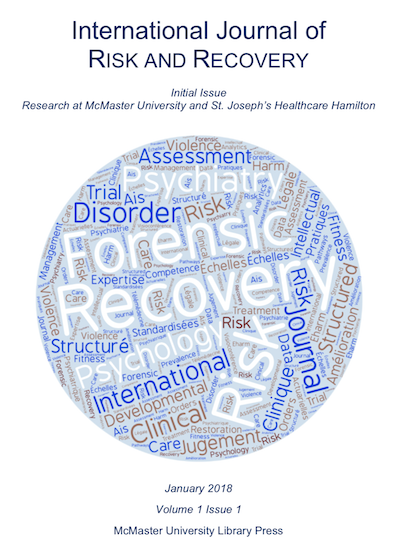The utility of treatment orders in the restoration of competence to stand trial
DOI:
https://doi.org/10.15173/ijrr.v1i1.3335Abstract
Involuntary treatment orders to restore competence to stand trial under the Criminal Code of Canada provide an opportunity to explore variables associated with restoration. We reviewed all 199 defendants assessed for fitness to stand trial in a catchment area of 2.3 million people over a two-year period, of which 26 were admitted to a regional psychiatric program under a treatment order. All had a psychotic disorder, and 92% (n=24) were restored to competence within the 60-day order period. No specific factors were associated with restoration. Unlike other studies, our study found that psychosis did not militate against restoration of competence.
References
Dusky v United States 362 U.S.402 (1960). (accessed on November 15, 2017)
Pirelli G, Gottdiener WH, Zapf PA. A metaanalytic review of competency to stand trial research. Psychology Public Policy Law 2011;17(1):1-53
Bonnie RJ. The competence of criminal defendants: a theoretical reformulation. Behav Sci Law 1992;10(3):291-316
Criminal Code of Canada, R.S.C. 1991, Section 2 (accessed on November 15, 2017)
Regina v. Taylor. (1992) 77 CCC (3d) 551 (accessed on November 15, 2017)
O'Shaughnessy RJ. AAPL practice guideline for the forensic psychiatric evaluation of competence
to stand trial: a Canadian legal perspective. J Am Acad Psychiatry Law 2007;35(4):505-508
Grisso T, Steinberg L, Woolard J, Cauffman E, Scott E, Graham S, et al. (2003). Juveniles' competence
to stand trial: a comparison of adolescents' and adults' capacities as trial defendants. Law Human Behav 2003;27(4):333-363
Morris DR, DeYoung NJ. Psycholegal abilities and restoration of competence to stand trial. Behav Sci Law 2012;30(6):710-728
Jackson v. Indiana 406 U.S. 715 (1972) (accessed on November 15, 2017)
Advokat CD, Guidry D, Burnett DMR, Manguno-Mire G, Thompson JW. Competency restoration treatment: differences between defendants declared competent or incompetent to stand trial. J Am Acad Psychiatry Law 2012;40(1):89-97
Colwell LH, Gianesini J. Demographic, criminogenic, and psychiatric factors that predict competency restoration. J Am Acad Psychiatry Law 2011;39(3):297-306
Mossman D. Predicting restorability of incompetent criminal defendants. J Am Acad Psychiatry Law 2006;35(1):34-43
Rodenhauser P, Khamis HJ. Predictors of improvement in maximum security forensic hospital patients. Behav Sci Law 1988;6(4):531-542
Cochrane RE, Herbel BL, Reardon ML, Lloyd KP. The Sell effect: involuntary medication treatment is a “clear and convincing” success. Law Human Behav 2013;37(2):107-116
Sell v. United States 282 F.3d 560 (2002) (accessed on November 15, 2017)
Criminal Code of Canada, R.S.C. 1985, c.46, s.672.58 (accessed on November 15, 2017)
American Psychiatric Association. Diagnostic and statistical manual of mental disorders: DSMIV-TR. Washington, DC: American Psychiatric Association, 2000
Quinsey VL, Harris GT, Rice ME, Cormier C. Violent Offenders: Appraising and Managing Risk. Washington, DC: American Psychological Association, 2006
Published
How to Cite
Issue
Section
License
Copyright Notice
Authors who publish with this journal agree to the following terms:
- Authors retain copyright of their work and grant the International Journal of Risk and Recovery the right of first publication with the work simultaneously licensed under a Creative Commons Attribution License. This allows others to share the work with an acknowledgement of the work’s authorship and initial publication in this journal.
- Authors are able to enter into separate, additional contractual arrangements for the non-exclusive distribution of the journal’s published version of the work (e.g., post it to an institutional repository or publish it in a book) with an acknowledgement of its initial publication in this journal.
- Authors are permitted and encouraged to post their work online (e.g., in institutional repositories or on their websites) before and during the submission process as it can lead to productive exchanges, as well as earlier and greater citation of published work. (See The Effect of Open Access.)

